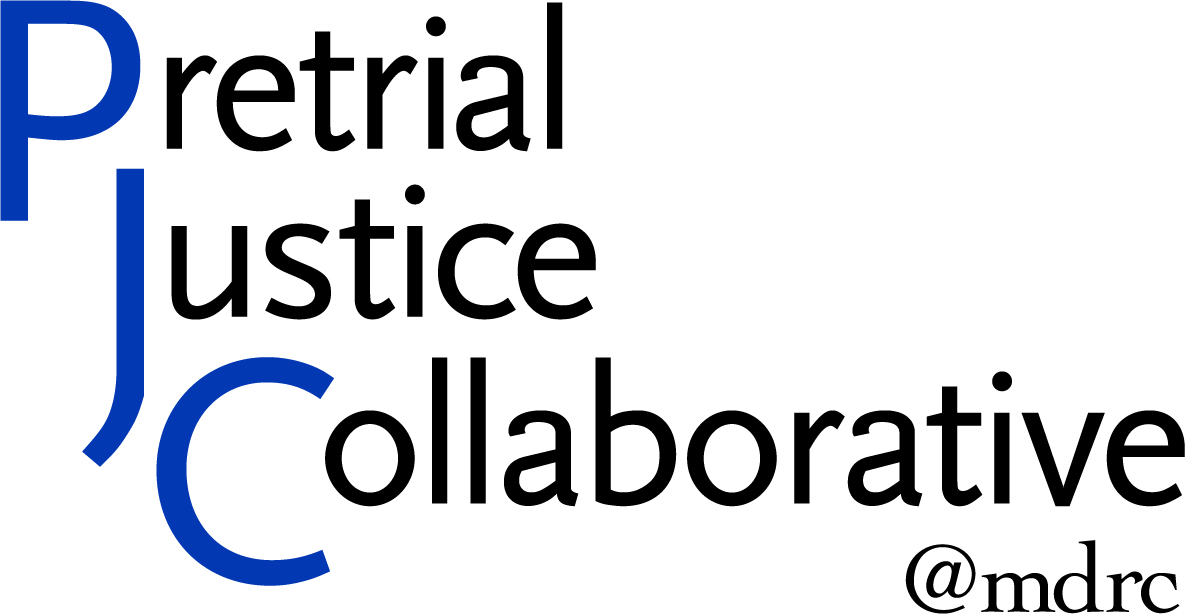Pretrial Justice Collaborative

Overview

Jurisdictions across the United States are taking steps to reduce the number of people who are detained in jail unnecessarily while awaiting trial. These reforms include the use of risk-assessment tools to inform release decisions and supervision programs during the pretrial period (before a case is adjudicated) to maintain court appearance and arrest avoidance. Such reforms hold the potential to reduce racial disparities and increase fairness in the pretrial process, by reducing the disproportionate negative impact of traditional cash bail systems on individuals and communities. However, many jurisdictions that are instituting these reforms are “flying blind” because there is little reliable evidence on their effectiveness or potential tradeoffs in terms of public safety or the legitimacy of the court process.
A diverse group of eight jurisdictions from across the United States have joined MDRC’s Center for Criminal Justice Research and Justice System Partners (JSP) to form the Pretrial Justice Collaborative. The goal of the Collaborative is to build and disseminate reliable, usable evidence about the most effective strategies for reducing pretrial detention, minimizing conditions of supervision while cases are adjudicated, and reducing racial and economic disparities, while maintaining court appearance rates and public safety.
The MDRC-JSP team has worked with each jurisdiction to conduct a process study and understand their pretrial practices and to conduct a descriptive analysis of trends during the pretrial period, including rates of arrest, release conditions, court appearance, and arrest avoidance. A subset of the jurisdictions is participating in additional research, including rigorous impact studies to compare the efficacy of specific pretrial supervision approaches and an analysis of the biases and mechanisms that contribute to racial/ethnic disparities throughout the case processing pipeline.
Additional Project Details
Agenda, Scope, and Goals
The eight partnering jurisdictions in the Pretrial Justice Collaborative have implemented a range of reforms to their pretrial justice systems, including risk assessment tools and creation or enhancement of pretrial supervision programs, to maintain court appearance rates and arrest avoidance. The goals of this project are to help partner jurisdictions assess the performance of their pretrial release interventions, with a focus on court appearance and arrest avoidance outcomes, and to identify the least burdensome pretrial supervision interventions necessary to maintain positive outcomes.
Through process, descriptive, and outcomes studies, the Pretrial Justice Collaborative is addressing the following research questions:
- What are the jurisdiction’s practices and policies related to pretrial release conditions and intervention strategies? How is pretrial supervision implemented?
- What are the trends in court appearance rates for defendants assigned to various release conditions and interventions?
In a subset of the jurisdictions, the project is conducting impact studies comparing the efficacy of specific pretrial supervision approaches, seeking to address the following research question:
- Is a particular pretrial supervision intervention as effective as a more restrictive intervention with respect to court appearance rates and new criminal charges?
Design, Sites, and Data Sources
The Pretrial Justice Collaborative includes three main components:
- Process and descriptive study. In each of the eight jurisdictions, the research team conducted a process study of pretrial practices and procedures for setting pretrial release conditions and a descriptive analysis of recent trends in the pretrial period, including those related to court appearance. The process study gathered qualitative data through interviews with court staff members and other stakeholders, and the descriptive analysis used criminal justice administrative records from state or local courts and local jails.
- Impact study. In a subset of the eight jurisdictions, the research team is conducting rigorous impact studies (using both experimental and non-experimental methods) to compare the efficacy of specific pretrial supervision approaches, in terms of court appearance and arrest avoidance. This analysis will use criminal justice administrative records from each of the jurisdictions. The research will result in policy evidence about whether less restrictive pretrial supervision interventions are as effective as more burdensome interventions at helping individuals avoid arrest and appear in court.
- Equity study. This component is designed to determine if and where racial/ethnic disparities exist in the pretrial period, using data collected for the descriptive study. Specifically, the equity study employs a three-step approach: (1) for seven sites, we investigated the extent to which there are racial/ethnic disparities at decision-making points in the case processing pipeline; (2) for two of the seven sites in Step 1, we will examine bias and mechanisms that may be contributing to any racial/ethnic disparities we find in Step 1 using statistical approaches such as predictive modelling and data science techniques; and (3) for one of the two sites in Step 2, we will conduct a qualitative study to help jurisdictions understand the types of structural constraints and barriers that might disproportionately affect people of color and impede successful navigation of their cases and court attendance.
Featured Work
Full Findings from the Pretrial Justice Collaborative
Full Findings from the Pretrial Justice Collaborative









